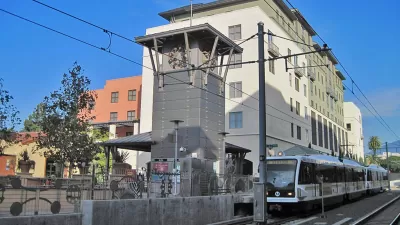In response to Sen. Scott Wiener's SB 827, former Los Angeles County Supervisor and former City Councilmember Zev Yaroslavsky provides his opinions on the unintended consequences of the bill on Southern California's landscape.
California State Senator Scott Wiener, a champion of dense housing and streamlining policies, unveiled Senate Bill 827 in January 2018. Sen. Wiener has since incorporated amendments into the bill—scheduled for a committee hearing in April—but detractors have been critical of the impacts of the legislation throughout the state. Former Los Angeles County Supervisor and former City Councilmember and presently director of the Los Angeles Initiative at UCLA Luskin School of Public Affairs Zev Yaroslavsky sat down with The Planning Report to discuss how Sen. Weiner's bill would radically change Southern California by "eviscerating decades of planning." Yaroslavsky also assesses Sen. Wiener's comments at a recent community hearing in Los Angeles organized by Assemblymember Laura Friedman, which can be seen here.
Yaroslavsky, deeply critical of SB 827, provides context for how this state legislation—touted as promoting transit-oriented development—would in fact undermine the region’s existing affordable housing stock and ability to chart its own future. Talking about both the preservation of existing historic communities and the impacts of lower-income renters, Yaroslavsky noted that "this bill has accomplished one thing: It has united tenants' rights organizations with small businesses and homeowners, all of whom are rising up against this broad-brush approach."
Yaroslavsky did not mince words when assessing the potential impacts of the legislation:
SB 827 is not a housing bill; it’s a real-estate bill. It is intended to monetize real estate. This bill is not about YIMBYs vs. NIMBYs; it’s about WIMBYS: Wall Street in My Backyard. With one stroke of the pen, the State Legislature could totally transform the economics of real-estate development in Los Angeles—while totally eviscerating decades of planning.
Yaroslavsky described a pathway forward for nuanced growth along existing transit corridors that are supporting quick transit solutions that are well-located. He noted that "Hollywood, the Wilshire corridor, the Vermont corridor, Van Nuys, NoHo, and many areas along the Expo, Gold, and Crenshaw light-rail lines—among others—lend themselves to densification. However, we have to be smart about where along these corridors we densify, and where we preserve neighborhood character. There is room for both."
Read more of Yaroslavsky's response to SB 827 in The Planning Report.
FULL STORY: Zev Yaroslavsky on Scott Wiener’s SB 827: The Triumph of WIMBYs

Planetizen Federal Action Tracker
A weekly monitor of how Trump’s orders and actions are impacting planners and planning in America.

Map: Where Senate Republicans Want to Sell Your Public Lands
For public land advocates, the Senate Republicans’ proposal to sell millions of acres of public land in the West is “the biggest fight of their careers.”

Restaurant Patios Were a Pandemic Win — Why Were They so Hard to Keep?
Social distancing requirements and changes in travel patterns prompted cities to pilot new uses for street and sidewalk space. Then it got complicated.

Platform Pilsner: Vancouver Transit Agency Releases... a Beer?
TransLink will receive a portion of every sale of the four-pack.

Toronto Weighs Cheaper Transit, Parking Hikes for Major Events
Special event rates would take effect during large festivals, sports games and concerts to ‘discourage driving, manage congestion and free up space for transit.”

Berlin to Consider Car-Free Zone Larger Than Manhattan
The area bound by the 22-mile Ringbahn would still allow 12 uses of a private automobile per year per person, and several other exemptions.
Urban Design for Planners 1: Software Tools
This six-course series explores essential urban design concepts using open source software and equips planners with the tools they need to participate fully in the urban design process.
Planning for Universal Design
Learn the tools for implementing Universal Design in planning regulations.
Heyer Gruel & Associates PA
JM Goldson LLC
Custer County Colorado
City of Camden Redevelopment Agency
City of Astoria
Transportation Research & Education Center (TREC) at Portland State University
Camden Redevelopment Agency
City of Claremont
Municipality of Princeton (NJ)





























